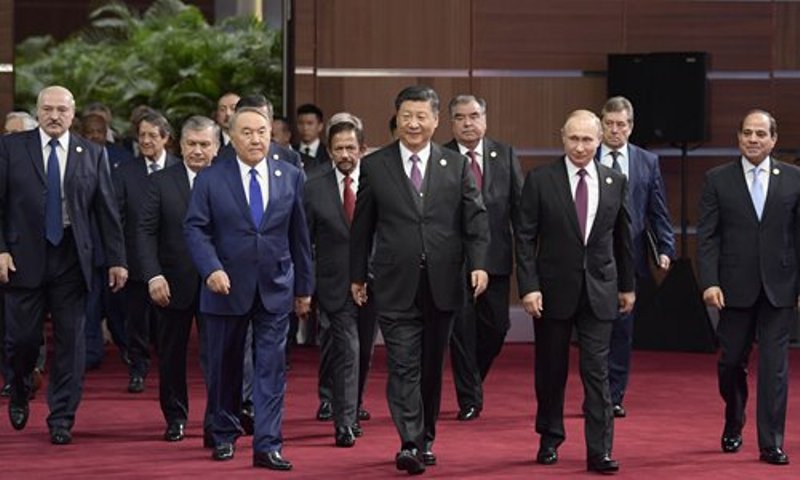
At a time when the global economy faces profound uncertainty and when China faces growing suspicion, the Chinese president also used the country's most important diplomatic occasion of the year to reassure world leaders of continued reform and opening of the Chinese economy.
Though aimed at some 40 world leaders and more than 5,000 delegates from over 150 countries attending the forum, Xi's remarks on further opening measures are also conducive to addressing trade tensions between China and the US, analysts said.
At the opening ceremony of the Belt and Road forum on Friday, Xi devoted a considerable proportion of his speech to talk about China's economic agenda, which is focused on deepening reforms and expanding openness.
'Going forward, China will take a series of major reform and opening-up measures and make stronger institutional and structural moves to boost higher-quality opening-up,' he said in the speech before announcing five specific measures, the Xinhua News Agency reported.
China will expand market access for foreign investment in more areas, intensify efforts to enhance international cooperation in intellectual property protection and global cooperation and increase the import of goods and services on an even larger scale, the president announced.
China will also more effectively engage in international macro economic policy coordination and will not resort to the beggar-thy-neighbor practice of RMB devaluation, he said.
Powerful reassurance
'These are concrete actions that will deliver tangible benefits to other economies,' Sun Lijian, an economist at the China Center for Economic Studies in Shanghai, told the Global Times on Sunday, noting that China has already taken action in these areas. 'But given the growing suspicion about China, mostly from Western countries, it is important to point out China's efforts.'
China has significantly cut the number of sectors that are off limits to foreign firms in recent years, passed a new Foreign Investment Law that guarantees better protection of foreign investors, seriously cracked down on IPR infringements and actively increased imports of foreign goods. Still, unfounded criticism of the Chinese economy continues to linger and has even led to trade tensions, analysts noted.
'These issues must be addressed directly,' Song Guoyou, director of Fudan University's Center for Economic Diplomacy, told the Global Times on Sunday. 'This is the perfect occasion and timing and I think most countries got the signal.'
Not about the US
But given the fact that Xi's speech touched on a wide range of issues, of which the US has long complained and demanded structural changes, some have even suggested that China is giving into US pressure.
'I think that gives too much credit to the US for something it has nothing to do with,' Mei Xinyu, a research fellow with the Chinese Academy of International Trade and Economic Cooperation, told the Global Times on Sunday. 'The measures were taken by China on its own initiative, based on its own needs.'
Xi also said that China made the move on its own because it would help China pursue high-quality growth, meet the higher demands of the Chinese people and promote world peace and development.
By announcing the measures at the forum, the Chinese president was also aiming to tell world leaders that China's reform and opening-up measures are not a response to any single country but will benefit all, analysts said.
However, the remarks, coming just days before a new round of China-US trade talks, will inject fresh momentum to the trade negotiations, analysts predicted.
A US trade delegation led by US Trade Representative Robert Lighthizer and Treasury Secretary Steven Mnuchin is slated to arrive in Beijing on Tuesday to hold talks with Chinese officials, led by Chinese Vice Premier Liu He, according to media reports.
Signs suggest that the two sides are near a trade deal, but there are also clear divisions between them over certain issues, including tariffs and a mechanism to verify implementation. US officials have lately floated concessions in those areas, with some media reports suggesting the US might lift tariffs on Chinese goods and is open to accepting punishment if it is found to be violating the agreement.
'If anything, the US would be the one that needs to be checked to see if it has implemented the agreement because its track record is not very good,' Mei said, pointing out that the US has backed out of previous deals. 'China won't have an issue with implementation if it agrees to it.'
9376**2050
Follow us on Twitter @IrnaEnglish
 solhkhabar | Peace International News Agency Peace International News Agency , Peace News , International Agency News of Peace
solhkhabar | Peace International News Agency Peace International News Agency , Peace News , International Agency News of Peace